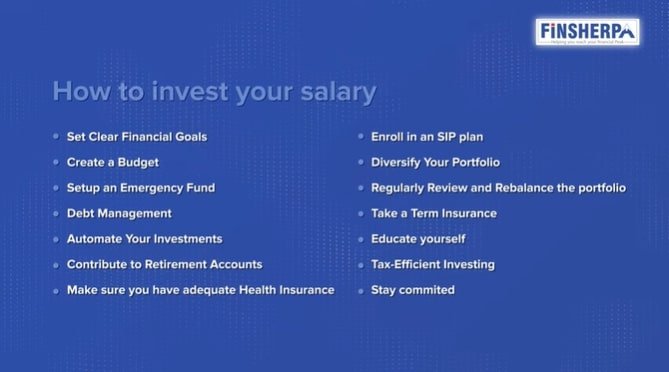_-_finsherpa_1731482467.jpg)
Investing Your Salary Wisely: The Ultimate Guide to Budgeting and Growing Your Wealth
Posted By: Blog

Managing your salary wisely is essential for a secure financial future. By planning how you save and invest, you can make sure you’re prepared for both short- and long-term goals. In this guide, we’ll walk through fourteen key points on how to invest your salary effectively, helping you build wealth over time.
Key Steps to Invest Your Salary Wisely
1. Define Clear Financial Goals
Before you start investing, outline your financial goals. These can include short-term objectives like a vacation or a new vehicle, medium-term goals, and long-term plans such as retirement. Defining these goals with specific timelines helps keep you focused and motivated.
2. Create a Budget
A budget is essential for tracking your income and expenses. It provides insight into where your money goes and helps you save and invest consistently. A well-organized budget ensures you’re regularly setting aside funds for your financial goals.
3. Set Up an Emergency Fund
Your first investment should be an emergency fund—an accessible savings reserve for unexpected expenses. Aim to save three to twelve months’ worth of living expenses, depending on your financial comfort level. This fund provides peace of mind and a stable foundation.
4. Manage Debt Wisely
Avoid high-interest debt, such as credit card balances or personal loans, as these can erode your wealth. Focus on clearing these debts while allowing productive debt, like a home loan, which contributes to asset creation.
5. Automate Your Investments
Set up automatic transfers to ensure a portion of your salary goes directly into your investments each month. This eliminates the temptation to spend that money and makes investing a seamless part of your financial routine.
Check out the video link for a more in-depth understanding
6. Participate in Employer Retirement Plans
If your employer offers a retirement plan, such as a Provident Fund (PF) or National Pension Scheme (NPS), make the most of it. Employer contributions are tax-free and offer significant long-term benefits. Optimizing this retirement contribution helps build a robust retirement fund.
7. Secure Adequate Health Insurance
Ensure you and your family have sufficient health insurance. Even if your company provides coverage, it’s wise to have a personal policy as a backup. Health insurance safeguards you financially in case of medical emergencies.
8. Invest Through Systematic Investment Plans (SIPs)
If market volatility is a concern, consider a Systematic Investment Plan (SIP) in mutual funds. SIPs help you invest a fixed amount regularly, averaging out the market price over time and reducing the impact of fluctuations. SIPs are ideal for long-term wealth building.
9. Diversify Your Investment Portfolio
Don’t rely solely on equity investments; diversify your portfolio to include bonds, commodities like gold, and other asset classes. A balanced investment basket can reduce risk and improve returns over time.
10. Regularly Review and Rebalance Your Portfolio
Review your investment portfolio every six to twelve months to evaluate performance and make adjustments. Rebalancing helps align your investments with your goals and removes underperforming assets.
11. Obtain Life Insurance for Dependents
If you have dependents or significant loans, consider term insurance to provide a safety net. Term insurance is a cost-effective way to ensure your family remains financially secure even in unforeseen circumstances.
12. Continuously Educate Yourself on Investing
Investing is a continuous learning journey. Educate yourself on investment strategies, and don’t be discouraged by mistakes. They are part of the learning process and can help you become a better investor over time.

Check out the video link for a more in-depth understanding
13. Plan for Taxes
Understanding tax implications on investments can help you maximize returns. Some tax-saving provisions can be beneficial, while others may affect your overall returns. Take advantage of tax benefits to improve your investment outcome.
14. Stay Committed to Long-Term Goals
Investing is a long-term journey, so stay committed and avoid the temptation of short-term decisions. By staying focused on your goals, you’ll steadily build a healthy portfolio and achieve financial stability.
Sticking with these essential points will ensure that you’re investing your salary in ways that support a secure, prosperous financial future.
For the complete video experience, click on this link
Category Finsherpa | Tags


